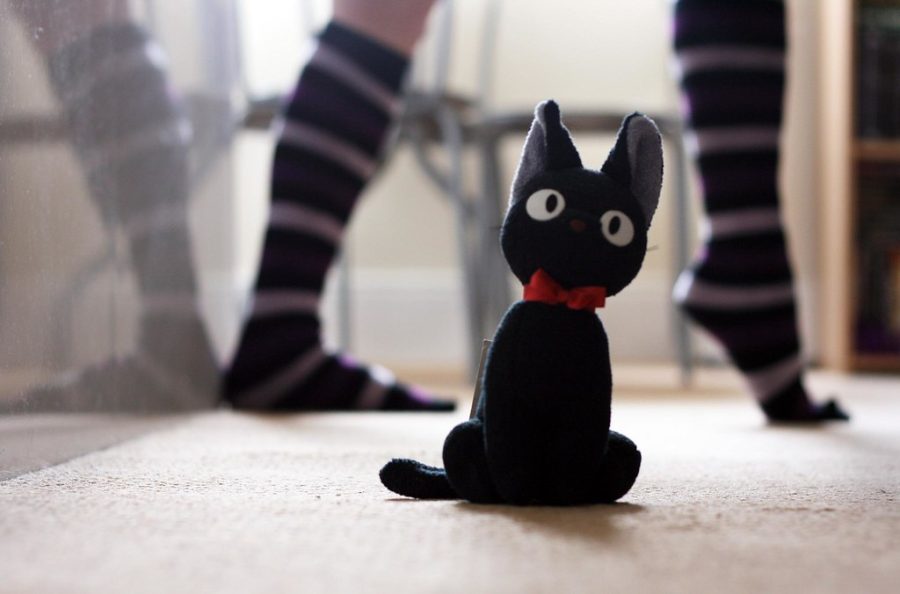Holt Superstitions
Superstitions; why do people get them? Wearing a lucky ring or hat, locking the door three times before feeling alright to leave it, listening to a playlist before a game or test and avoiding saying something too good before a big make or break event: all of these things are superstitions, and despite being presented with no concrete definitions for a superstition, most people naturally have them. Holt students share some of these superstitions, from physicality to practicality, that help them feel more comfortable and confident in their day to day.
Oftentimes people keep items with them for luck. “In eighth grade, I wore a necklace that had a tree made of wire with crystals of the colors of the rainbow to look like the leaves of the tree,” Alyson Winn (‘25) said. “I wore this to a talent show audition and got into the talent show. Since then, for any major event, I go and look for that necklace. If I can’t find that necklace, I wear an opal pendant necklace.”
Actions hold power for people; after all, actions speak louder than words. Because of this, acting out certain things provides people comfort, and most importantly, consistency. “I have on multiple occasions spilled salt over my shoulder,” Katelyn Downey (‘24) said. Spilling salt is an old yet common sign of bad luck, and Mahayana Buddhist tradition says that throwing salt over the left shoulder is an action that fends off evil spirits, and is believed to reverse the bad luck caused from spilling salt. Actions are very powerful, and whether or not they actually hold power is largely irrelevant to the comfort that they bring to those who partake.
Music creates many things. Confidence, excitement, inspiration and a lot more that persuades people to listen to music in preparation for things, or anticipation for them. “I have a whole playlist I have to listen to before my tennis matches to help me get into the right mindset,” Annabell Crosson (‘24) said. “Listening to music before a swim meet always pumps me up,” Christopher Daniels (‘26) said.
Arguably one of the most influential superstitions in the people’s lives is the avoidance of certain things or actions. “I am an extremely superstitious person,” Katelyn Downey (‘24) said. “I don’t wear matching socks unless for a specific occasion, I have never watched a winning hockey game so I don’t watch the Stanley Cup, I don’t walk under ladders or break mirrors and I avoid black cats.” Avoidance superstitions can be a powerful thing, and on occasions, avoidance and action can go hand and hand. Spilling salt is unlucky, so throwing a pinch of salt over the shoulder is supposed to reverse it. Saying something that is too good to be true is traditionally bad luck, and the phrase “knock on wood” is because knocking on wood is said to reverse this. The mix of these different kinds of superstitions is very interesting and helps ease the worries of some, depending on the kind of superstition.
Superstitions are very powerful and go back centuries, and despite criticisms of those who are superstitious, superstitions help people feel more in control of their safety. Whether they hold validity is unknown and may never be known, but the understanding that superstitions when they don’t cause paranoia or are harmful can help people feel safer, more in control and generally more confident in their actions and lives.












Sara • Aug 31, 2023 at 12:38 PM
Love the photo with the Jiji plush!
Emily Teismann • Nov 8, 2022 at 2:18 PM
So true! I’m not super superstitious (but heck, you can’t not be at least a little when you technically live in house 13 on your street). I knock on wood all the time (typically my head first and then on actual wood for good measure if whatever in the world I talked about really needs it). I also wear some of crystals I have as good luck charms and to ward away the nonsense that likes to strike sometimes. Anyway, glad to see you and Avery still working away with the Tribe! I was going back to look at an article I did to possibly use the information for a pamphlet I might design for my work and happened to see a cute black cat stuffed animal and curiosity got me! Hope you both are having a good fall semester! -Emily 🙂